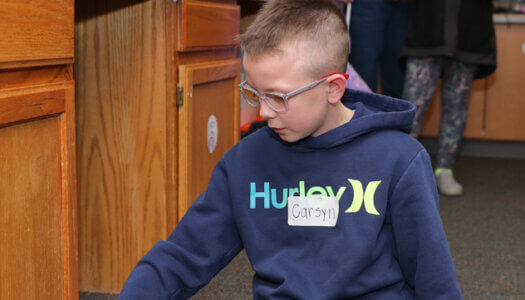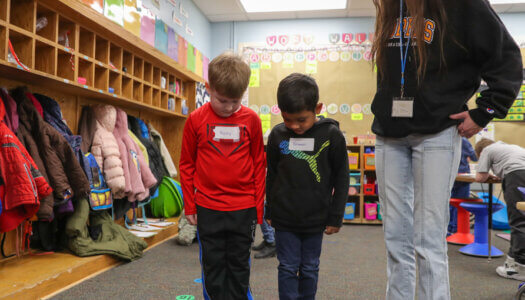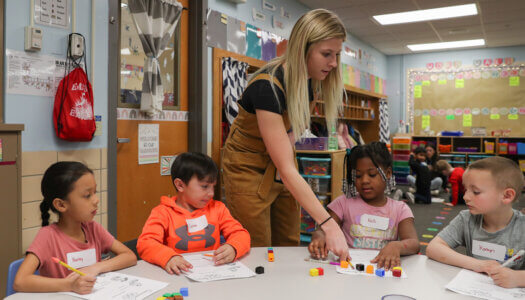
By TYLER ELLYSON
UNK Communications
KEARNEY – Dittrick McKillip watched intently as the plastic straw sailed across the classroom before landing under a student’s desk.
“I can’t believe I actually made it that far,” he said with excitement. “It definitely went farther than the last one.”
Exactly how far did it travel? The Emerson Elementary School fourth grader was about to find out, but first he had to write down an estimate then measure with a meterstick.
The difference between his guess and the actual distance determined his ranking in the Measurement Olympics.
Led by teacher candidates from the University of Nebraska at Kearney, Thursday’s event featured a variety of hands-on activities designed to strengthen the elementary students’ math skills in a fun and engaging way. They competed in the drinking straw javelin, paper plate discus, cotton ball shot put, high jump, sponge squeeze and other events that challenged them to estimate and measure distance, height, area, mass and volume. During the closing ceremonies, each participant received a prize donated by a local business.
Emerson Elementary students from all six grade levels, K-5, took part in the Measurement Olympics, allowing them to explore important math concepts through interesting applications.
Fourth grade teacher Chris Weis said her students love learning from Lopers because they bring a lot of interaction to the classroom.
“They’re always very excited for it,” she said. “There’s a high level of engagement because our kids get that individual attention.”
The collaboration is a win-win since it also gives UNK students an opportunity to develop and deliver a lesson plan in a school setting.
“These students are putting into practice what they’re learning on campus,” said Jane Strawhecker, a professor in the UNK Department of Teacher Education.

Strawhecker is the instructor and field supervisor for the math methods II course that partnered with Emerson Elementary. A total of 51 students, most of whom will student teach next semester, gained valuable skills through the field experience.
In an elementary classroom, UNK teacher candidates are able to see different learning styles and determine which approaches work best for specific situations. They’re exposed to the “complexities of teaching that sometimes get overlooked.”
“That’s hard to practice in an on-campus class because you need actual students to work with in meaningful ways,” Strawhecker said. “It’s this kind of experience that helps us think critically about our teaching style for the future.”
UNK junior Mikayla Brandl of Omaha has been visiting area schools since her first year on campus. In addition to the math methods course, which hosted a math game night at Emerson Elementary last semester, she spends her Mondays working with students in a kindergarten classroom at Minden Public Schools.
“I love teaching, so being around kids and helping them learn makes me happy,” said Brandl, who’s studying elementary education with a special education minor. “Because I’m able to get into classrooms before I student teach, I definitely feel like I’ll be more prepared when that time comes.”
Brandl wants to teach kindergarten or first grade after graduation, but she proved she can handle a group of fourth graders during Thursday’s event.
“I think the kids had fun, and I had fun doing it,” she said. “This is a lesson I can teach in any grade, so that helped a lot.”
Along with the skill-building, field experiences like the Measurement Olympics allow UNK students to network with teachers and administrators, which can lead to job opportunities down the road.
Weis, who earned her bachelor’s and master’s degrees from UNK, has supported numerous teacher candidates during her Kearney Public Schools career. Students from a science methods course also come to her classroom to gain teaching experience.
“Lots of those teachers end up being part of our school system, so there’s value for everyone involved,” Weis said.
Strawhecker agrees.
“Having a successful field experience builds confidence in our future teachers,” she said. “And the research shows that confident teachers breed confident students, so it comes full circle.”
PHOTOS BY ERIKA PRITCHARD, UNK COMMUNICATIONS








